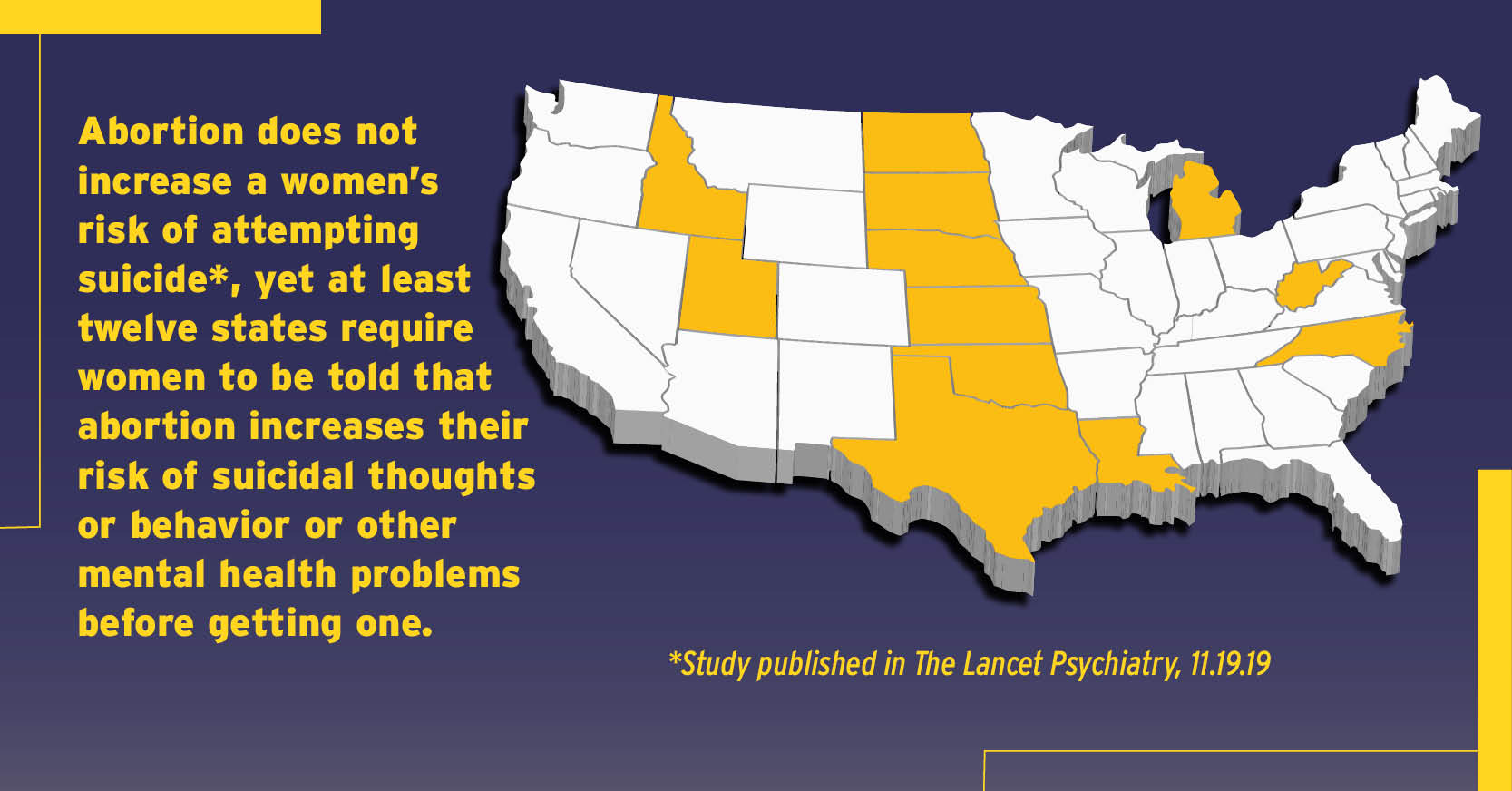- November 20, 2019
- By Kelly Blake
Policies based on the notion that undergoing an abortion causes or increases women’s risk of attempting suicide are misinformed, according to the results of a 17-year study led by a School of Public Health researcher.
The research, published yesterday in The Lancet Psychiatry, is the first to compare the risk of women attempting suicide before and after an abortion, and found a similar risk of non-fatal suicide attempts regardless of whether women had abortions during the study period.
“The view that having an abortion leads to suicidal thoughts, plans or even suicide attempts has been used to inform abortion policies,” said Julia R. Steinberg, assistant professor of family science and the study’s lead author. “In the U.S., there are 12 states with laws that require women going for an abortion to be told they are at higher risk of suicide or other long-term mental health consequences. The evidence from our study does not support this.”
 The authors examined data from 523,380 Danish women aged 18 to 36. They compared the risk of non-fatal suicide attempts associated with a first, first-trimester abortion to the risk associated with having no abortion from 2000 through 2016, examining whether the risk changed before and after the abortion. They adjusted for age, calendar year, women’s history of childbirth, mental and physical health, their parents’ mental health and their parents’ socioeconomic status.
The authors examined data from 523,380 Danish women aged 18 to 36. They compared the risk of non-fatal suicide attempts associated with a first, first-trimester abortion to the risk associated with having no abortion from 2000 through 2016, examining whether the risk changed before and after the abortion. They adjusted for age, calendar year, women’s history of childbirth, mental and physical health, their parents’ mental health and their parents’ socioeconomic status.
Although women in the study who had abortions also had a higher risk of first-time non-fatal suicide attempts, a closer look at the data suggests this cannot be attributed to the abortion itself, the researchers reported. Instead, pre-existing mental health problems, which were more common in women having abortions than in women not having abortions, were associated with the increased risk of attempted suicide.
Previous research on abortion and suicidal ideation has not considered prior mental health, has had low participation and high attrition rates, or has relied on self-reporting of abortion and suicidal ideation. The new study is the first to address these limitations.
It is also the first to examine rates and relative risk of first non-fatal suicide attempts both in the year before an abortion and the year after (and longer after the procedure as well), allowing researchers to unravel whether abortions are a contributing factor.
Abortions can be accessed legally in Denmark, so it is not clear whether the results generalize to other contexts, particularly where access to abortion is legally restricted, the researchers said. They also note that not all women with mental health problems may seek help; therefore, the effect of previous mental health problems may be underestimated.
Of the women included in the study, 9% had at least one first-trimester abortion. In addition, 2% of study participants attempted suicide during the 17-year period. For the women who had an abortion, the unadjusted rates of suicide attempts in the year before and after the abortion were similar: 8.9 attempts in every 1,000 women in the year before an abortion, and 8.6 attempts in every 1,000 women in the year after.
Over time, that rate decreased to 4.6 attempts in every 1,000 women per year between one to five years after an abortion, and to 2.2 in every 1,000 women per year after that—similar to the rate for women who did not have an abortion during the study period (2 per 1,000 women per year).
“Five years after an abortion, the unadjusted rate of first-time suicide attempts reduces to the same rate as in women who have not had an abortion, countering the notion of ‘post-abortion syndrome,’ in which it is hypothesized that the effects are not experienced until a long time afterwards,” Steinberg said.
The strongest risk factors for attempting suicide were having previous contact with a psychiatric service and previous use of antidepressant, antianxiety and antipsychotic medication.
“Our findings suggest that when a woman is seeking advice and care surrounding an abortion, it could be appropriate to screen for mental health issues in order to pick up on pre-existing problems and to prevent future ones occurring,” said Trine Munk-Olsen from Aarhus University, Denmark.
Topics
ResearchUnits
School of Public Health